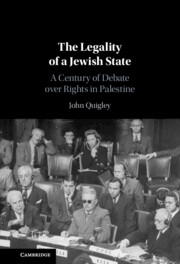Book contents
- The Legality of a Jewish State
- The Legality of a Jewish State
- Copyright page
- Contents
- Figures
- Preface
- United Nations Entities
- Abbreviations
- Frontispiece
- Part I Battalions or Barristers
- Part II A Pair of Godfathers
- Part III A Flight from Justice
- Part IV From the Ashes of War
- Part V Whose State?
- 17 Did the Palestine Mandate Survive the League of Nations?
- 18 Did the United Nations Inherit a Power to Partition Palestine?
- 19 Did the United Nations Have a Power to Partition Palestine?
- 20 Was the Future Government Resolution Binding?
- 21 Was Partition of Palestine Fair?
- Part VI Jewish Statehood on the Ground
- Part VII Legitimacy in the New Century
- Notes
- Select Bibliography
- Index
21 - Was Partition of Palestine Fair?
from Part V - Whose State?
Published online by Cambridge University Press: 09 December 2021
- The Legality of a Jewish State
- The Legality of a Jewish State
- Copyright page
- Contents
- Figures
- Preface
- United Nations Entities
- Abbreviations
- Frontispiece
- Part I Battalions or Barristers
- Part II A Pair of Godfathers
- Part III A Flight from Justice
- Part IV From the Ashes of War
- Part V Whose State?
- 17 Did the Palestine Mandate Survive the League of Nations?
- 18 Did the United Nations Inherit a Power to Partition Palestine?
- 19 Did the United Nations Have a Power to Partition Palestine?
- 20 Was the Future Government Resolution Binding?
- 21 Was Partition of Palestine Fair?
- Part VI Jewish Statehood on the Ground
- Part VII Legitimacy in the New Century
- Notes
- Select Bibliography
- Index
Summary
The International Court of Justice arguably has a power to use extralegal considerations in certain situations and to make decisions on the basis of fairness. When the General Assembly debated the possibility of voting a partition of Palestine, the predominant strain of reasoning was that the Arab and Jewish parties could not come to agreement between them, hence the only solution was to divide the territory. Only a few states mention considerations of fairness. Some said that Jewish statehood had been promised during the League era. Some said that atrocities committed against European Jewry under National Socialism, on top of discrimination and attacks stretching farther back in history, warranted Jewish statehood in Palestine. In response, it was argued that the population of Palestine should not lose its territory because the Jews had been mistreated in Europe. A number of states proposed that Western states should accept substantial number of Jews from Europe. That alternative was opposed by those advocating Jewish statehood in Palestine.
- Type
- Chapter
- Information
- The Legality of a Jewish StateA Century of Debate over Rights in Palestine, pp. 168 - 178Publisher: Cambridge University PressPrint publication year: 2021



